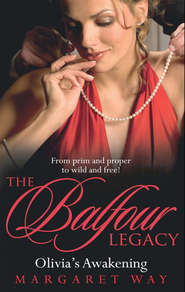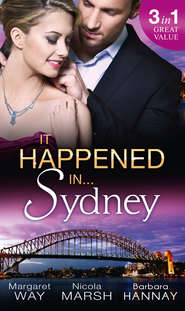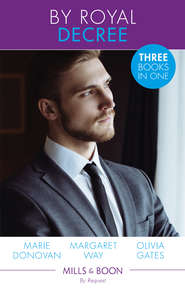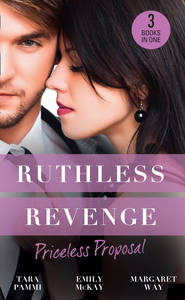По всем вопросам обращайтесь на: info@litportal.ru
(©) 2003-2024.
✖
Outback Heiress, Surprise Proposal
Автор
Год написания книги
2019
Настройки чтения
Размер шрифта
Высота строк
Поля
Bryn began CPR—he had to if there was any chance of saving Sir Francis. He was thankful he had spent time perfecting the procedure.
The paramedics, urgently despatched, arrived in under six minutes. They took over from Bryn Macallan, but it was evident to them all that the nation’s ‘Iron Man’ was dead.
Charles Forsyth was so shocked by the violence and suddenness of the event he sat in the grip of paralysis, unable to stand, let alone speak. The truth was he had thought his father was going to live for ever.
It was left to Bryn Macallan to take charge. Bryn, though he experienced the collective shock, felt no great grief. Sir Frank Forsyth had lived and died a ruthless man—brilliant, but guilty of many sins. Wearing the deep camouflage of long friendship he had done terrible things to the Macallan family in business since the death of his grandfather.
‘Frank has always had the potential to be an out-and-out scoundrel,’ Bryn’s grandmother had warned him after his grandfather’s funeral. ‘It was Theo, as honourable a man as Frank is amoral, who kept that potential for ruthlessness in check. Now Frank holds the reins. Mark my words, Bryn, darling. It’s time now for the Macallans to look out!’
Her prediction had been spot-on. Since then bitter rivalries and deep resentments had run like subterranean rivers through everything the Forsyths and the Macallans did. But the two families were tied together through Titan.
The Forsyths had their vision. Bryn Macallan had his.
It was Frank Forsyth and Theo Macallan, geologists, friends through university, who had started up Titan in the late 1960s. They had discovered, along with part-aboriginal tracker Gulla Nolan, a fabulous iron-ore deposit at Mount Gloriana, in the remote North-West of the vast state of Western Australia—a state which took up one-third of the huge island continent. Today this company, Titan, was a mighty colossus.
Within minutes the death of the nation’s ‘Iron Man’ was part of breaking news on television, radio and the internet. The extended family was informed immediately. The only family member not present in the state capital, Perth, was Francesca Forsyth. She was the daughter of Sir Frank’s second son, Lionel, who had been killed along with his wife and their pilot in a light plane crash en route from Darwin to Alice Springs. Francesca had been orphaned at age five.
It had been left to her uncle Charles and his wife Elizabeth to take on the job of raising her. Indeed, Elizabeth had taken the bereaved little girl to her heart, although she and Charles had a daughter of their own—Carina, their only child, some three years older than her cousin. Carina had grown up to be the acknowledged Forsyth heiress; Francesca who shunned the limelight was ‘the spare’.
What was not known by society and the general public alike was that Carina Forsyth, for most of her privileged life, had harboured a deep, irrational jealousy of her young cousin—though she did her best to hide it. Over the years she had almost perfected the blurring of the boundaries between her true nature and the role of older, wiser cousin she presented to the world. But sadly Carina was on a quest to destroy any chance of happiness her cousin might have in life. She had convinced herself from childhood that Francesca had stolen her mother’s love. And the melancholy truth was that, although Elizabeth Forsyth loved her daughter, and went to great lengths to demonstrate it, the beautiful little girl, ‘child of light’ Francesca, through the sweetness of her nature had gained a large portion of her aunt’s heart.
Francesca, acutely intelligent and possessed of a sensitive, intuitive nature, had not been unaware of her cousin’s largely hidden malevolence. Consequently she had learned very early not to draw her cousin’s fire, and was equally careful not to attract undue attention. Carina Forsyth was the Forsyth heiress. What Carina did not appreciate was that Francesca had never found any difficulty with that. Enormous wealth could be a great blessing or a curse, depending on one’s point of view. Being an heiress was not part of Francesca’s ethos.
Even the cousins’ looks were polarised. Both young women were beautiful. Not just an accolade bestowed on them by a fawning press. A simple statement of fact. Carina was a stunner: tall, curvy, a blue-eyed blonde with skin like thick cream, and supremely self-assured as only those born rich could be. Francesca, by contrast, was raven-haired, olive-skinned, and with eyes that were neither grey nor green but took colour from what she was wearing. Seen together at the big functions their grandfather had expected both young women to attend, they made startling foils: one so golden, secure in her own perfection, with the eye-catching presence of—some said cattishly behind her back—a showgirl, and the other with an air of refinement that held more than a touch of mystery. Carina went all out to play up her numerous physical assets. Francesca had chosen to downplay her beauty, for obvious reasons.
The greatest potential for danger lay in the fact that both young women were in love with the same man. Bryn Macallan. Carina’s feelings for him were very much on show. Indeed, she treated Bryn with astonishing possessiveness, managing to convey to all that a deep intimacy existed between them. Francesca had always been devastated by the knowledge. Indeed, she had to live with constant heartache. Bryn preferred Carina to her. There was nothing else to do but accept it—even if it involved labouring not to show her true feelings. She knew exactly what might happen if she allowed her emotions to surface, however briefly. There could be only one outcome.
What Carina wanted, Carina got.
While the heiress was at the family mansion to receive the news, Francesca was at Daramba, the flagship of the Forsyth pastoral empire, in Queensland’s Channel Country. Francesca, a gifted artist herself, since leaving university—albeit with a first-class law degree—had involved herself in raising the profile of Aboriginal artists and acting as agent and advisor in the sale of their works. For one so young—she was only twenty-three—she had been remarkably successful.
Unlike her glamorous high society cousin, Francesca Forsyth felt the burden of great wealth. She wanted to give back. It was the driving force that paved the way to her strong commitment to the less fortunate in the broad community.
Francesca, it was agreed, needed to be told face to face of her grandfather’s sudden death and brought home. Bryn Macallan elected to do it. An experienced pilot, he would fly the corporation’s latest Beech King Air. He was considered by everyone to be the best man for the job. Though everyone knew the late Sir Frank had dearly wished for a match between Bryn and his elder granddaughter Carina, the fulfilment of that wish had always eluded him. The two rival families were also keenly aware that Bryn and Francesca shared a special bond, which was not to be broken for all the families’ tensions. Bryn Macallan was, therefore, the man to bring Francesca home.
CHAPTER ONE
LOOKING down on the ancient Dreamtime landscape, Bryn experienced such a feeling of elation it lifted the twin burdens of ambition and family responsibility from his shoulders—if only for a time. He loved this place—Daramba. He and his family had visited countless times over the years, when his much-loved grandfather had been alive. These days his mother and his grandmother didn’t come. For them the close association had ended on the death of Sir Theo, when Francis Forsyth—mega-maniac, call him what you will—got into full stride. It had been left to Bryn to bridge the gap. It was part of his strategy. His womenfolk knew what he was about. They were one hundred per cent behind him. But in spite of everything—even the way his family had been stripped of so much power by stealth—he found Daramba miraculous.
The name in aboriginal, with the accent on the second syllable, meant waterlily—the native symbol of fertility. One of nature’s most exquisite flowers, the waterlily was the totemic Dreamtime ancestor of the Darambal tribe. The vast cattle station, one of the largest in the land of the cattle kings, was set in the Channel Country’s riverine desert. That meant it boasted numerous lagoons in which waterlilies abounded. This was the year the long drought had broken over many parts of the Queensland Outback, giving tremendous relief to the Inland. Daramba’s countless waterways, which snaked across the station, the secret swamps where the pelicans made their nests, and the beautiful lagoons would be floating a magnificent display. Even so, there was nothing more thrilling than to see the mighty landscape, its fiery red soil contrasting so brilliantly with the opal-blue sky, cloaked by a glorious mantle of wildflowers that shimmered away to the horizon.
It was a breathtaking display, almost too beautiful to bear—as if the gates of heaven had been opened for a short time to man. All those who were privileged to see the uncompromising desert turned into the greatest floral display on earth—and there weren’t all that many—even those who knew the desert intimately, still went in awe of this phenomenal rebirth that flowed over the land in a great tide. Then, when the waters subsided, came the all too brief period of utter magic when the wildflowers had their dazzling days in the sun: the stiff paper daisies, the everlastings that didn’t wilt when plucked, white, bright yellow and pink, the crimson Sturt Peas, the Parrot peas, the native hibiscus, the Spider lilies and the Morgan flowers, the poppies and the Firebushes, the pure white Carpet of Snow, the exquisite little cleomes that were tucked away in the hills, the lilac Lambs’ Tails and the green Pussy Tails that waved back and forth on the wind. One would have to have a heart of stone not to be moved by such a spectacle.
Bryn was vividly reminded of how in her childhood Francesca had revelled in the time of the flowers. All those miles upon miles of flowers and perfume. It had been her own childhood fantasy, her dreamworld, one of her ways of surviving the tragic loss of her parents. He remembered her as a little girl, running off excitedly into an ocean of white paper daisies, her silvery laughter filling the air, while she set about making a chain of the wildflowers to wear as a diadem atop her long hair. Beautiful hair, with the polished gloss of a magpie’s wing. Usually Carina had ruined things, by eventually tugging the garland off her younger cousin’s head and throwing it away, claiming the paper daisies might be harbouring bugs. The truth of it was Carina had been sending out a message that demanded to be heard. Francesca was meant to live in her shadow. And she never let her forget it.
‘There’s no telling where this might end!’ his grandmother, Lady Macallan, had once confided, a furrow of worry between her brows. ‘Carina deeply resents our little Francey. And it will only grow worse.’
It had. Though a lot of people didn’t see it, Carina was very cunning—but Francey wouldn’t hear a word against her. That was the essential sweetness of her nature. Francey was no fool—Bryn was certain she privately admitted to herself that Carina was as devious and manipulative as that old devil Sir Frank, and he knew he, himself, was a bit of an erotic obsession with Carina. It was naked in her eyes, every time she looked at him. And he had to admit to a brief, hectic affair with her when the two of them were younger. Carina was a beautiful young woman, but, as he had come to discover, there was something twisted in her soul. He supposed he could live with it as long as no harm came to Francey—who, in her way, was as big an obsession with Carina as he was. Carina’s mother, Elizabeth, had doted on the angelic bereaved child that had been Francesca. She had taken Francey to her heart. That was when it had all started. He was sure of it.
The Beech King Air B100, their latest acquisition, was flying like a bird. It differed from Titan’s other King Airs, its model easy to distinguish on the ground, with different engine exhausts, and the propellers in flat pitch at rest. Bryn loved flying. He found it enormously relaxing. He had already commenced his descent. The roof of the giant hangar was glinting like molten silver, almost dazzling his shielded eyes. He fancied he could smell the scents of the wild bush. There was no other smell like it. Dry, aromatic, redolent of vast open spaces and flower-filled plains.
Station kids on their lunchbreak ran at him the instant he stopped the station Jeep. He patted heads and shoulders while distributing a small hoard of sweets, asking how they were doing and telling a few kid-oriented jokes that were greeted with merry peals of laughter. Rosie Williams, the young schoolteacher, stood on the porch, smiling a bright welcome.
‘Good to see you, Mr Macallan.’
‘Good to see you too, Rosie.’ He sketched a brief salute. No matter how many times he told her to call him Bryn, she couldn’t get round to it. ‘Hope these kids aren’t giving you any trouble?’ He ruffled the glossy curls of a little aboriginal child standing next to him, confidently holding his hand.
‘No, no—everything’s fine. We’re making a lot of progress.’
‘Great to hear it.’
More giggles. Sunlight falling on glowing young faces.
A few minutes later he was back in the Jeep, waving a friendly hand. He hoped to find Francesca at the homestead, but that was all it was—hope. He’d probably have to go looking for her. The remote station had not yet been contacted with news of Sir Frank’s death. Best the news came from him. Face to face.
Five minutes more and he came into full view of the homestead. After Frank Forsyth had acquired the valuable property in the late 1970s he’d lost little time knocking down the once proud old colonial mansion that had stood on the spot for well over one hundred years, erecting a huge contemporary structure more in keeping with his tastes. Eventually he’d even got rid of the beautiful old stone fountain that had graced the front court, which had used to send sparks of silver water out onto the paved driveway. Bryn remembered the three wonderful winged horses that had held up the basins.
His grandfather, when he had first seen the new homestead, had breathed, ‘Dear God!’
Bryn remembered it as though it were yesterday. Sir Francis had come tearing out of the house when he’d heard their arrival, shouting a full-throated greeting, demanding to know what his friend thought.
‘It’s very you, Frank,’ his grandfather had said.
Even as a boy he had heard the irony Sir Frank had missed.
‘Fantastic, Sir Francis!’ Bryn had added his own comment weakly, not wanting to offend the great Sir Francis Forsyth, his grandad’s lifelong friend and partner. Anyway the new homestead was fantastic—like a super-modern research station.
It faced him now. A massive one-storey building of steel, poured concrete and glass, four times as big as the original homestead, its only nod to tradition the broad covered verandahs that surrounded the structure on three sides. No use calling it a house or a home. It was a structure. Another monument to Sir Frank. The right kind of landscaping might have helped to soften the severity of the façade, but the approach was kept scrupulously clear. One was obviously entering a New Age Outback homestead.
Jili Dawson, the housekeeper, a strikingly attractive woman in her early fifties, greeted him with a dazzling smile and a light punch in the arm.
‘Long time, no see!’
‘Been busy, Jili.’ He smiled into liquid black eyes that were alight with affection. Jili’s eyes clearly showed her aboriginal blood, which came from her mother’s side. Her father had been a white stockman, but Jili identified far more with her mother’s family. Her skin was completely unlined, a polished amber, and her soft voice carried the familiar lullaby rhythms of her mother’s people. ‘I don’t suppose I’m lucky enough to find Francey at home?’ he asked, casting a glance into an entrance hall as big as a car park.
‘No way!’ Jili gave an open-handed expansive wave that took in the horizon. ‘She with the group, paintin’ out near Wungulla way. Hasn’t bin home for coupla days. She’s okay, though. Francey knows her way around. Besides, all our people look after her.’
‘Wasn’t that always the way, Jili?’ he said, thinking how close contact with the tribal people had enriched his own and Francey’s childhood. Carina had never been a part of any of that, holding herself aloof. ‘Listen, Jili, I’ve come with serious news. We didn’t let you know yesterday because I was coming to fetch Francey and tell her in person.’
‘The man’s dead.’ Jili spoke very calmly, as though the event had already cast its shadow—or as if it was written on his forehead.
‘Who told you?’ He frowned. ‘Did one of the other stations contact you?’ News got around, even in the remote Inland. On the other hand Jili had the uncanny occult gift of tribal people in foretelling the future.
Jili rocked back and forth slowly. ‘Just knew what you were gunna say before you said it. That was one helluva man. Good and evil. Plagued by devils, but devils of his own makin’. We know that, both of us. I honoured your fine, wise grandad, and your dear dad. A great tragedy when he bin killed in that rock fall. But they’re with their ancestors now. They look down from the stars that shine on us at night. I have strong feelings for your family. You bin very kind to me. Treat me right. Lot rests on your shoulders, Bryn, now Humpty Dumpty has gone and fallen off the wall. What I want to know is this—is it gunna change things for Jacob and me? Are we gunna lose our jobs?’
Jacob Dawson, Jili’s husband, also part aboriginal, was a long-time leading hand on the station—one of the best. In Bryn’s opinion Daramba couldn’t do without either of them. And Jacob would make a far better overseer than the present one, Roy Forster, who relied far too heavily on Jacob and his diverse skills.
‘It all has to be decided, Jili,’ he said, with a heartfelt sigh. ‘Charles will inherit. I can’t speak for him. He can’t even speak for himself at the moment. He’s in deep shock.’











